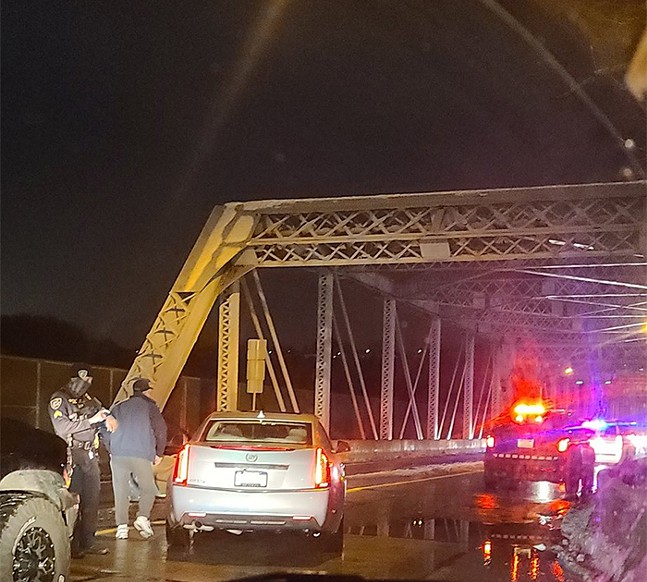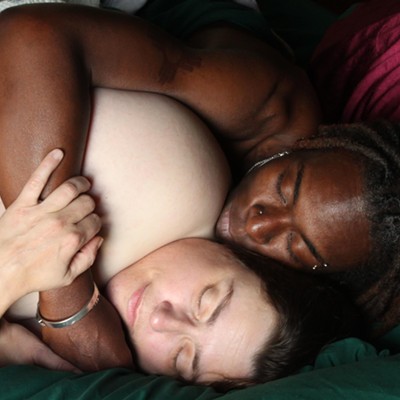
At about 5:40 p.m. on Dec. 20, law enforcement officials reportedly started a checkpoint on the McKeesport-Duquesne Bridge, and were searching people’s vehicles as they entered and exited McKeesport. According to Tanisha Long, who was driving into the city to drop off clothes at UPMC McKeesport, police either stopped or looked in every vehicle that she saw cross the bridge, including hers. She says police even requested that drivers exit vehicles and open their trunks. Several agencies responded to the McKeesport shooting, and it's unclear which agency conducted the checkpoint on the bridge.
“I saw a car approach an officer, and the officer tells them to get out,” says Long, who added that she arrived at the bridge at about 5:40 p.m., just as vehicles started to back up due to an apparent checkpoint. “Then an officer kept tapping on this other guy’s window and made him open the windows and then open the trunk and close his trunk.”
Long says she also witnessed an officer tell a driver to exit his vehicle and empty his trunk so they could search it.
There were also reports of several homes being searched by the police, and residents said police did not provide warrants. Fawn Walker Montgomery of Take Action Mon Valley advocacy group says the Mon Valley city of about 19,000 residents was swarmed by police officers shortly after the afternoon shooting.
“There were multiple checkpoints and roads blocked off,” says Montgomery, adding that she witnessed people on the street being stopped and questioned by police. “It was like martial law. It was traumatizing."
Montgomery says that several people reached out to her group to detail how the police searched their homes. She says police searched and requested to search the homes of Francis’ relatives and acquaintances. “That is not probable cause, just because they are related,” says Montgomery.
Advocacy groups and experts say the police’s response was an overreach of authority and potentially a violation of the Fourth Amendment, which prohibits unreasonable search and seizures.
Vic Walczak, legal director at the ACLU of Pennsylvania, says that if allegations of warrantless home searches and a vehicle checkpoint in McKeesport are true, then “this would be a clear violation of the Fourth Amendment to the U.S. Constitution.”
“Any home entry or vehicle stop without probable cause is unconstitutional unless it meets a small number of recognized emergency circumstances,” says Walczak. “From the information available, it does not yet appear that these searches fell within these circumstances."
Walczak continued in a statement that “the shooting of any individual is tragic, but it does not give police license to run roughshod over peoples’ constitutional rights in their effort to arrest the suspect.” He added that it is highly unlikely police can justify continuing the search methods residents witnessed yesterday.
Coleman McDonough of the Allegheny County Police says in a statement that searches were carried out by SWAT officers and detectives on Sunday. He says the searches “were conducted with the consent of the home owners/residents” and that “consent is an exception to the constitutional probable cause requirement.”I got searched twice coming and leaving UPMC. This man was made to get out his car pic.twitter.com/qdrhh98FR8
— Tanisha Long (@Tanishaevonne) December 21, 2020
He also noted that there were a plethora of other agencies who responded to McKeesport and that he cannot speak to every search conducted by other police officers. He adds that specific complaints about police conduct should be sent to the "respective police chief of the officers involved so that the department may conduct an inquiry into the alleged actions of their officers."
David Harris is a law professor at the University of Pittsburgh and a national policing expert. He says that the Fourth Amendment is especially strict when it comes to protections for people when they are in their home.
Harris says that if police want to search a home against the will of the resident, they need probable cause or a warrant, but that an emergency is the only exception. He acknowledges that the suspect being reportedly armed and shooting a police officer might give credence to the police believing Francis’ apprehension is an emergency. Francis hasn't been convicted of any violent crimes in the past, according to court reports. He was convicted of one felony related to dealing drugs in 2019, and one misdemeanor theft charge in 2017.
But, Harris adds, the fact that police searched multiple homes seemingly at the same time doesn't necessarily support the notion that police were in a “hot pursuit,” which is typically considered an emergency. He calls those apparent multiple searches at the same time “troubling.”
Additionally, both Long and Montgomery point out the disparities in which police in Allegheny County have responded to shootings that didn’t involve police officers. Long notes she has never seen such a large response for any of the 111 homicides that have occurred this year in Allegheny County, let alone the hundreds of non-fatal shootings.
“The biggest thing for me that was irritating, was that it was such a disproportionate response. They shut the city down,” says Long. “We have so many unsolved crimes, and we have never seen that kind of response.”
As for Allegheny County Police’s response that all of their searches had consent, Harris says that consent has to be voluntary and can’t be in response to a threat.
“If they are told they have to do this, then that is not consent,” says Harris.
Montgomery says that some people who had their homes searched were confronted at gunpoint by police officers. She says that officers cursed at residents.
“The police were extremely violent yesterday,” says Montgomery of the home searchers. “We had people tell us they were cursing, and saying they would shoot to kill. It was a violent response.”
Harris says if these stories are true, then it would be hard to call the searches that occurred yesterday voluntary consent.
As for vehicle checkpoints, Harris says that even a brief slow down and check can be considered a seizure. He says the courts have granted police the power to conduct checkpoints for terrorism responses, DUI searches, immigration enforcement near the border, and for some issues that go beyond just general law enforcement. For example, the Illinois v. Lidster case of 2004 permitted police set up a checkpoint to distribute fliers and request help as part of a traffic-death investigation.
Harris says that courts will also cut police officers some slack with checkpoints when it comes to emergencies, but it depends on how deep the search and seizures were.
However, the U.S. Supreme Court has also ruled against vehicle checkpoints set up for the purpose of "general crime control." In Indianapolis v. Edmond of 2000, the Supreme Court ruled that a checkpoint used to search for illegal drugs was unconstitutional and that the “Court has never approved a checkpoint program whose primary purpose was to detect evidence of ordinary criminal wrongdoing.” The opinion, written by Reagan-appointee Justice Sandra Day O’Connor, stated the drug-enforcement use of a checkpoint was too general, and if it were allowed, “there would be little check on the authorities' ability to construct roadblocks for almost any conceivable law enforcement purpose.”
Long says that when she drove through the checkpoint on the McKeesport-Duquesne Bridge, she asked the police several times why they were searching her vehicle, and she says they failed to provide an answer. She says police asked her, “Has anyone asked you for a ride?” and “Do you have anyone in the car?”
Long says police officers were either peering in cars with open windows as they slowly drove by, or they were asking drivers to stop, to roll down windows, and open their trunks. Long says she didn’t even know police were searching for a suspect who allegedly shot a police officer until several hours later when she posted about her experience on social media.
“It was aggressive and violating at the least, and illegal at the most,” says Long.
Montgomery was in McKeesport yesterday evening and says that the bridge checkpoint was just one of several checkpoints throughout the city. She says that all 12 people who reported being searched by the police to Take Action Mon Valley were Black. Francis, the suspect in the shooting, is also Black.
In a statement, Take Action Mon Valley wrote that the police’s actions in McKeesport were a “clear violation of our constitutional and civil rights," and the group is calling for Francis to be brought in alive.
“It seems like if you were related to, or a friend of Francis, then police would search your house,” says Montgomery. “This was all Black people that were getting searched.”
Black people in Allegheny County and Pittsburgh are already disproportionately targeted for search and seizures. Montgomery says that the aggressive police response scared her and others, and she feared for the safety of Black people in the region last night. This was a reason she was advising some people to not push back if police demanded to search their homes.
Editor's Note: Original version of this story has been edited to show the Allegheny County Police Department was not running the checkpoint on the Duquesne-McKeesport Bridge.


















